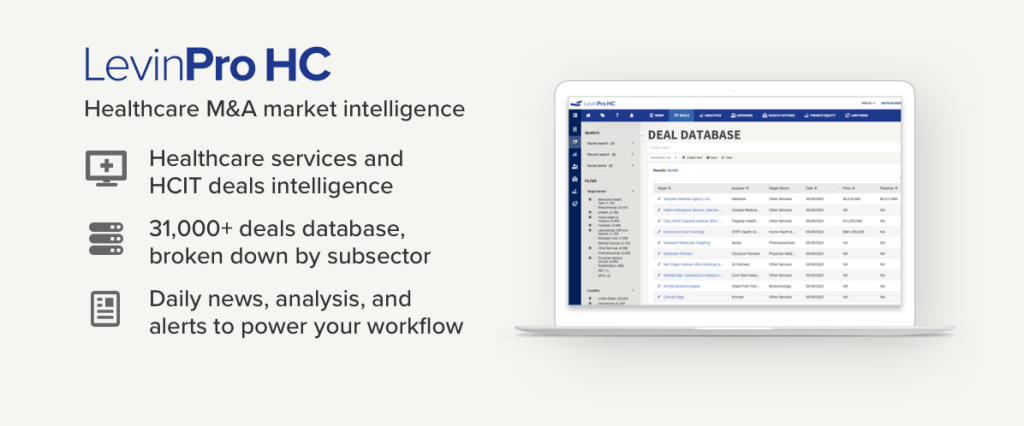
The role of private equity in healthcare was the focus of the 6th Annual Physician Transactions Conference on March 9, 2023. Physicians, private equity investors, investment bankers and other healthcare business leaders gathered in Las Vegas to talk about what independent practices need to know about brokering a deal with a private equity firm.
Attendees posed questions to other physicians who have already entered into PE deals, and panelists provided insights to help physicians consider whether partnering with outside investors will be the right path forward for their practices.
Levin Associates was in attendance at the conference. Here is a summary of the main takeaways the panelists shared throughout the day.
Clinical autonomy meets economic opportunity
The healthcare industry has been experiencing rapid developments in recent years. Innovation has been a major driver for change, especially as technological advancements have allowed complicated procedures to be performed in outpatient settings.
Dana Jacoby, the CEO of Vector Medical Group, said she believes we are experiencing “the most innovative time in healthcare’s history” and that the era of increased investment is here to stay. She emphasized that there has been consolidation across the board in the last decade, involving:
· Hospitals acquiring smaller practices
· Physician-owned practices merging
· Private equity platforms growing
· Major corporations like CVS, Walgreens and Amazon expanding services, like pharmacies and primary care
The common thread in the opening panel discussion was that all of this consolidation has made it much harder for smaller practices to stay competitive, and that physicians are interested in acquiring sufficient capital to continue building their practices. There are various paths they can choose to achieve that goal and the panelists viewed private equity as a positive option.
Tom Price, MD, an orthopedic surgeon, former congressman, and former Secretary of Health and Human Services, explained orthopedic specialists in particular have become more open to considering outside investment in recent years. Dr. Price, who is on the Board of Directors for Triumph Orthopedics, listed a few factors that physicians might find attractive:
· The ability to gain equity in the practice itself
· The opportunity to focus solely on treating patients rather than on running a business
· Growth potential, without the physician needing to risk their own money
Dr. Price added that after leaving public office he was initially skeptical about the role of private equity in healthcare. He said he changed his attitude because, in his experience, he’s witnessed doctors maintaining their clinical autonomy when they partner with reputable private equity firms. He stressed that medical decisions belong to the doctors and their patients, and that the PE partners have no role in that area.
Panelist Michael Meneghini, MD, an orthopedic surgeon who specializes in hip and knee replacements, was among those who said he chose to start his own practice — the Indiana Joint Replacement Institute – in part because of the opportunity for greater clinical autonomy. He is also the co-founder of M2 Orthopedics, which is a portfolio company of Archimedes Health Investors.
Dr. Meneghini added partnering with private equity can help relieve the “administrative headaches” associated with running a medical practice. He also predicted that moving forward, private equity-backed platforms will slow the pace of their acquisitions and focus even more heavily on quality.
This theme of quality over quantity came up during discussions about valuations.
A more realistic, tempered market for valuations
The sentiment among the panelists at the Physician Transactions Conference was that while healthcare remains a “robust” market – with now even being described as a “golden time” for investment — valuations are expected to come down from record highs.
Hector Torres, a Managing Director at DC Advisory, described 2021 as an “outsized year” for valuations – boosted by the fact that private equity firms and other strategic investors had significant funds and strong motivation to invest in healthcare practices. There was a lot of excitement about getting involved in healthcare, and buyers were willing to spend big to get in on the action.
The consensus was that in 2023 and beyond, valuations for medical practices would be more “tempered” and “rational” compared to the immediate aftermath of the COVID-19 pandemic. Goran Dragolovic, the President and CEO of Covenant Physician Partners, referred to higher interest rates as the “elephant in the room” currently impacting lenders’ decisions, as well.
One of the questions posed to panelists centered on how physicians should react to the current market conditions: Should they wait to make a deal with a private equity firm until there is another spike in valuations? Should they wait and see what happens with interest rates?
The resounding answer from the panelists was “no.” Much like individual investors are advised against trying to time the stock market, the same holds true for physician practices. As Gary Herschman of Epstein Becker Green pointed out, the post-COVID reaction caused valuations to go “over the top” in 2021; waiting for a moment like that to hit again is not advisable because sellers could be waiting “forever.”
Another point of agreement was that moving forward, buyers are expected to spend more time on due diligence before closing a deal. Chance Sherer, Managing Director of VMG Health, commented that “capital isn’t being thrown around” haphazardly and sophisticated investors want to ensure a medical practice is healthy, so to speak, before acquiring it.
Cleaning up the house
Dragolovic compared selling a medical practice to selling a home: If your house has a lot of wear and tear, fix those issues before trying to sell the house!
A marriage metaphor was also used frequently throughout the conference. If partnering with a private equity firm is like getting married, then the months-long due diligence process is like dating.
Kieran Higgins, a partner at Citrin Cooperman Advisors LLC, told the physicians in the audience it’s vital to have the practice’s affairs in order – including financial statements, tax records, any ongoing legal issues—before attempting to negotiate a deal. He said buyers will try to “poke holes” in the practice’s records and find errors, making it all the more important for sellers to have their paperwork in order.
The panelists also stressed the importance of addressing any lingering issues, such as malpractice lawsuits or questions about billing. Finding proverbial “skeletons in the closet” later on in the negotiation process could lead to expensive delays, as pointed out by Chris Pivik, Vice President of Physician Partnerships at American Orthopedic.
Torres added that before beginning any deal process, medical practices should first ensure that all of the physician partners are on the same page. Private equity transactions can take about 6-10 months, Torres said, and disagreements can dramatically slow the process.
Picking the right partner
Due diligence goes both ways, said Nate Bard, the CEO of Triumph Orthopedics. He stressed that when deciding which private equity firm to partner with, physician groups need to look beyond just the proposed valuations.
The keynote panel featured 5 physicians who have already partnered with private equity. When asked if they had ultimately chosen the highest bidder, 3 out of 5 said “no.”
That’s because cultural alignment is just as, if not more, important than the financials of the deal. As Bard explained, both sides need to be on the same page about a growth plan for the deal to become a successful partnership.
Erin Laviola is a writer for Levin Associates.
Levin Associates provides comprehensive coverage of the deals, companies, and trends shaping the healthcare industry. Clients access proprietary M&A transaction data and daily news/analysis through the LevinPro platform. Schedule a demo today to see what LevinPro can do for your team.
© 2023 Irving Levin Associates, LLC. All rights reserved.


